7. Harry Potter and the Chamber of Secrets (Rating 1.5/5; Original Rating 1.5/5)
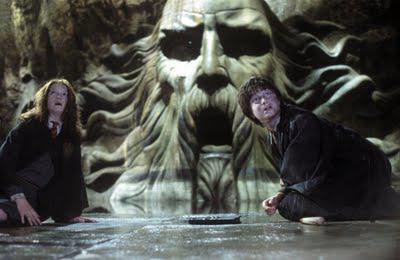
It is difficult to believe that Chris Columbus was once something of a protégé of Steven Spielberg, given his utter inability to capture anything like wonder in his direction. Spielberg considered doing the first film (though admittedly he had the utterly stupid idea of doing it as a cartoon), but I would have given anything for him to have directed this. Imagine the director of Jaws handling the basilisk's frenzied whispers in the pipes, the best part of the book (incidentally also the weakest of the written franchise) almost totally brushed aside here. Columbus needed to truly capture the magic and joy of this realm before things went dark with the third installment, and his failure to do so is, I think, what undermines not only this film but the whole franchise. See it for Ron's last gasp as a true equal among the three friends before his subsequent marginalization, and for Kenneth Branagh's note-perfect performance as Lockhart.
6. Harry Potter and the Half-Blood Prince (Rating 1.5/5: Original Rating 3/5)
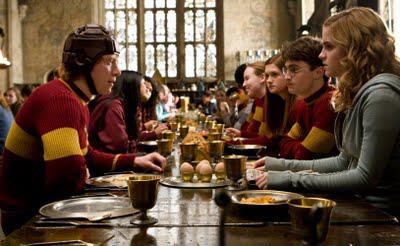
If The Order of the Phoenix ironed out too many of the subplots of Rowling's most lugubrious book, excising the good with the bad, Half-Blood Prince devotes far too much focus to the extraneous details of the richest novel of the series. Admittedly, it's a hard juggling act to go between nostalgia for a world the characters will soon see fall and the perilously dark trips into Voldemort's past and the unexpected recesses of previously worshipped characters. But again, Columbus' failure to establish the HP universe's awe negates the former, creating a lopsided oscillation between lilting and despairing that ultimately makes the film's tone one of mass indifference. In my original, more positive review, I noted Tom Felton's performance, and it's only gotten better to me since. Always the best of the child actors, Felton doesn't miss a beat translating Rowling's deepening of the character, and this movie is worth watching multiple times for him alone. Shame that's that only reason for watching it.
5. Harry Potter and the Philosopher's/Sorcerer's Stone (Rating 2/5; Original Rating 2/5)
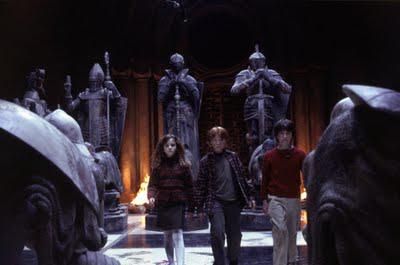
Columbus' hackdom isn't as noticeable here as even with his banal direction, he simply cannot destroy the feeling of pure giddiness radiating from the children as they step into this world. I don't know if Daniel Radcliffe ever topped the moment when Hagrid arrives and tells him a wizard; the look of confusion giving way to elation and hope is one of the franchise's most powerful moments. Still, the rest of the film feels like perfunctory franchise establishment rather than true immersion into the unknown and fantastic and again, it's hard not to lie back and imagine what might have been if a better director got a hold of the material. Oh, and it features one of John Williams' absolute worst scores, an unsubtle, clanging contraption that sounds like some noisemaker Fred and George might have set off in the prefects' bathroom.
4. Harry Potter and the Goblet of Fire (Rating 2.5/5; Original Rating 3-3.5/5)
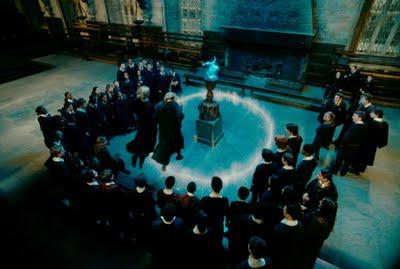
At last, we move to a film I could possibly recommend, though Goblet of Fire suffers from rush-job pacing and misplaced humor as it barrels through its three tasks. The most action-packed of the films, at least until the protracted climax that is the final installment Goblet of Fire traded its predecessor's ethereal spook for blunt blockbusting, but there are still moments (like the possessed Krum in the maze) that unsettle as well as anything in Cuaron's macabre vision. But overall, Newell's Goblet does not capitalize on the mixture of solid plotting, unforced wit and mounting atmosphere that make the book maybe the sturdiest of Rowling's set. Nevertheless, its setpieces are splendid enough that its straightforward manages to combine the popcorn sheen of Columbus' films with Cuaron's more shadowy realm in a largely inoffensive manner.
3. Harry Potter and the Order of the Phoenix (Rating 3/5; Original Rating 2.5/5)
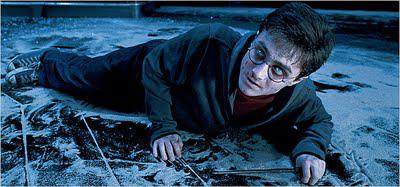
It is a sign of sensitive fandom when one gets excessively hung up on an omission in the translation from book to screen, but the complete marginalization of Neville is so grating I take it out on this film, which has enough other issues to spread out my annoyance. Matthew Lewis, without ever calling attention to himself, wonderfully progressed Neville in his flakes of screen time throughout this franchise, and I was looking forward to see him shoulder the heavier reveals about his character, but that gets promptly thrown out. Instead, we get all of Harry's moping without any of the offsetting properties of the book. The climax in the Hall of Mysteries is an exercise in tedium, sapping all the delirium and terror from the book's run through madness and making for a dully linear romp. However, everything to do with Dolores Umbridge, from Imelda Staunton's ingenious performance to the mounting rebellion against her, is more than solid. Also Luna Lovegood and Bellatrix Lestrange feel just the way they do on the page. Additional silver lining: we must suffer none of Hermione's house-elf campaigning.
2. Harry Potter and the Prisoner of Azkaban (Rating 4/5; Original Rating 4/5)
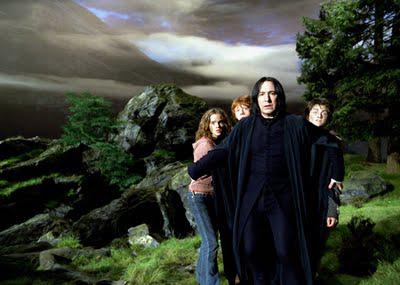
Everyone chill. I got this.
If Chris Columbus never properly conveyed the more whimsical nature of Hogwarts and the wizarding world, Alfonso Cuaron had no problems whatsoever bringing out that universe's capacity for nightmarish darkness. His version of Hogwarts feels as much an elaborate prison as Azkaban itself, a more pronounced visualization of the buried suggestion of this parallel in Rowling's writing. Though Cuaron cuts or modifies too much for his own good—the climactic scene in the Shrieking Shack, for example, loses much of the intensity of the written sequence, perhaps my favorite moment of Rowling's entire series—but mostly the changes all aid Cuaron's Grimm's fairy tale atmosphere. And again, the damn casting in this movie: whoever picked David Thewlis to play Remus should get a fruit basket or an awkward shoulder-punch or something. Furthermore, John Williams' final score for the franchise makes up for the music-box-from-hell din of his Philosopher's Stone soundtrack with one of the most understated scores of his career.1. Harry Potter and the Deathly Hallows, Part 1 (Rating 4.5/5; Original Rating 4/5)
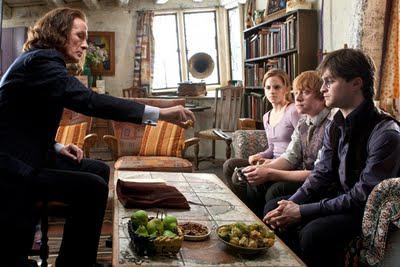
Rereading Rowling's convoluted, calculatedly base-covering conclusion convinced me that the movie could have done with mass trimming rather than bifurcation. Yet Yates managed to not only make the plodding first half work as a standalone film, he finally overcame his limitations and put out the finest film of the franchise, loaded with rich, understated character growth. Where his previous Potter films had moments of unintentional ennui, Yates' Hallows deliberately plods and makes sure to record its characters reactions to their banal situation. Frankly, Yates captures their frustration of being secluded from the action and often left with no clue of how to progress better than Rowling, and his light tweaks, such as the Platonic dance between Harry and Hermione, are wonderful. Radcliffe and Watson, the least compelling major actors of this franchise and the ones to whom so many other actors' time has been sacrificed, finally justify that monopolization of screen time with their finest work yet. Bonus points for the Lotte Reigner-inspired animated segment of the Three Brothers story, one of the most striking moments in the whole franchise, and even of 2010 film.

